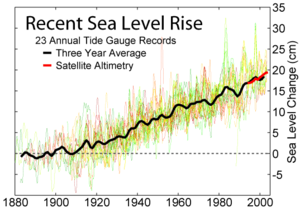increased evaporation
Over the course of the 20th century, evaporation rates have reduced worldwide ; this is thought by many to be explained by global dimming. As the climate grows warmer and the causes of global dimming are reduced, evaporation will increase due to warmer oceans. Because the world is a closed system this will cause heavier rainfall, with more erosion. This erosion, in turn, can in vulnerable tropical areas (especially in Africa) lead to desertification due to deforestation. On the other hand, in other areas, increased rainfall lead to growth of forests in dry desert areas.
Many scientists think that increased evaporation could result in more extreme weather as global warming progresses. The IPCC Third Annual Report says: "...global average water vapor concentration and precipitation are projected to increase during the 21st century. By the second half of the 21st century, it is likely that precipitation will have increased over northern mid- to high latitudes and Antarctica in winter. At low latitudes there are both regional increases and decreases over land areas. Larger year to year variations in precipitation are very likely over most areas where an increase in mean precipitation is projected"
Sea level rise

With increasing average global temperature, the water in the oceans expands in volume, and additional water enters them which had previously been locked up on land in glaciers, for example, the Greenland and the Antarctic ice sheets. An increase of 1.5 to 4.5 °C is estimated to lead to an increase of 15 to 95 cm (IPCC 2001).
The sea level has risen more than 120 metres since the peak of the last ice age about 18,000 years ago. The bulk of that occurred before 6000 years ago. From 3000 years ago to the start of the 19th century, sea level was almost constant, rising at 0.1 to 0.2 mm/yr; since 1900, the level has risen at an average of 1.7 mm/yr ; since 1993, satellite altimetry from TOPEX/Poseidon indicates a rate of about 3 mm/yr.
In a paper published 18th May 2007, the climatologist, James Hansen presented new evidence. George Monbiot, a British journalist, summarises his findings as follows:
"The IPCC predicts that sea levels could rise by as much as 59 cm this century. Hansen’s paper argues that the slow melting of ice sheets the panel expects doesn’t fit the data. The geological record suggests that ice at the poles does not melt in a gradual and linear fashion, but flips suddenly from one state to another. When temperatures increased to 2-3 degrees above today’s level 3.5 million years ago, sea levels rose not by 59 centimetres but by 25 metres. The ice responded immediately to changes in temperature."
Acidification
The world’s oceans soak up much of the carbon dioxide produced by living organisms, either as dissolved gas, or in the skeletons of tiny marine creatures that fall to the bottom to become chalk or limestone. Oceans currently absorb about one tonne of CO2 per person per year. It is estimated that the oceans have absorbed around half of all CO2 generated by human activities since 1800 (120,000,000,000 tonnes or 120 petagrams of carbon)
But in water, carbon dioxide becomes a weak carbonic acid, and the increase in the greenhouse gas since the industrial revolution has already lowered the average pH (the laboratory measure of acidity) of seawater by 0.1 units, to 8.2. Predicted emissions could lower it by a further 0.5 by 2100, to a level not seen for millions of years.
There are concerns that increasing acidification could have a particularly detrimental effect on corals (16% of the world's coral reefs have died from bleaching caused by warm water in 1998, which coincidentally was the warmest year ever recorded ) and other marine organisms with calcium carbonate shells.
Reference
http://en.wikipedia.org/wiki/Effects_of_global_warming

No comments:
Post a Comment